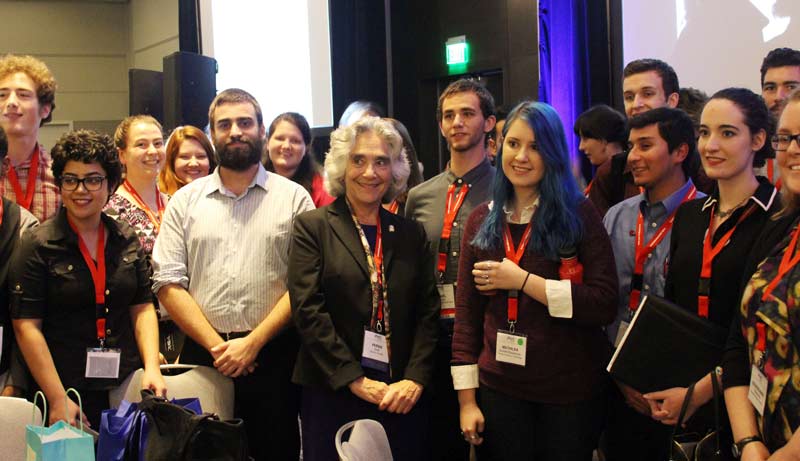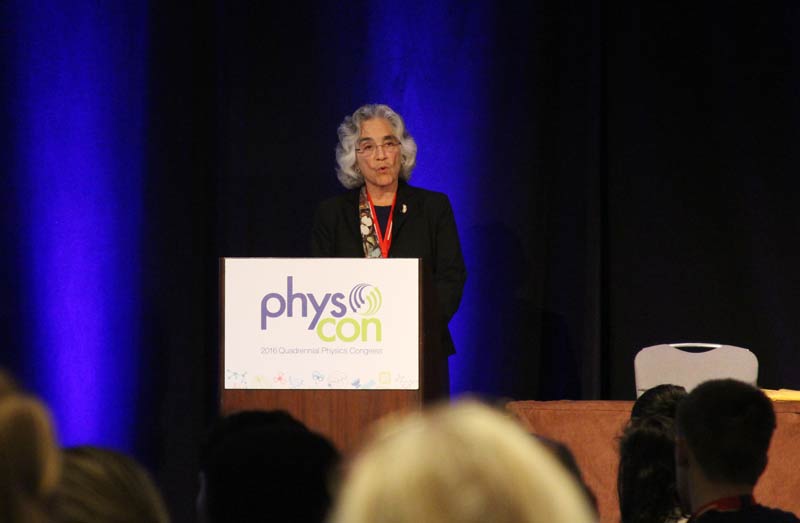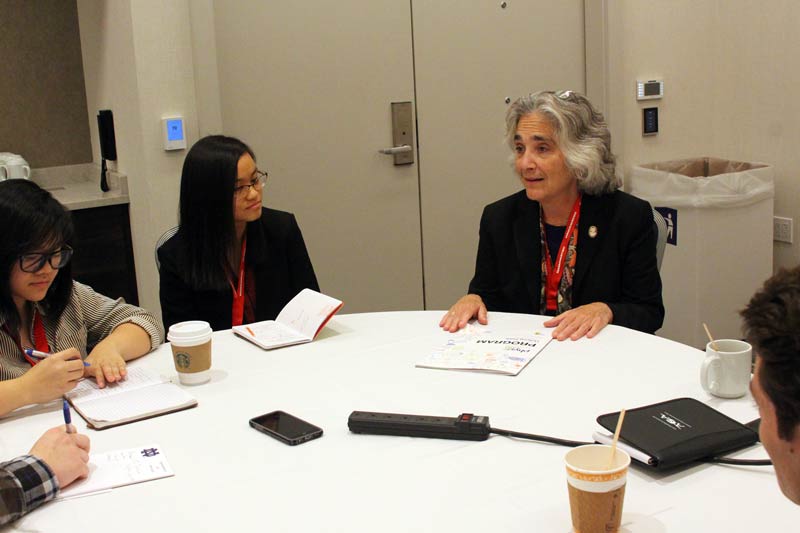Sigma Pi Sigma Physics Congress (PhysCon)
November 3, 2016 to November 5, 2016
San Francisco, CA
Meeting host: By:Chloe Leigh Ong, James St. John, and Yuhao Qiao
SPS Chapter:

The 2016 PhysCon showcased a marvel of resources for aspiring physicists. In addition to the workshops, poster sessions, tours, and networking, we got to hear from distinguished scientists in plenary talks. We also had the pleasure of meeting one of the speakers, Dr. Persis S. Drell.
Interviewing Dr. Drell was a great honor. The former director of SLAC National Laboratory and the Dean of the School of Engineering at Stanford University had a lot of advice when it came to undergraduate concerns. In short, she said: “Expect change.”
To those of us that seem to have our entire career planned out, these words aren’t the most comforting things to hear. Undergraduate students that are already planning to take the GRE next semester are tempted to say, “I know what I want and I’m going to get it no matter what it takes.” Dr. Drell is living proof that that approach is not always the best one. Though her PhD is in atomic physics, she moved into particle physics and engineering and now is the dean of engineering at one of the most prestigious schools in the country.
Dr. Drell said if she was told as a PhD student that she could move into these other fields, she would have never believed it. However, because she was willing to be flexible in her career choices, she was able to take advantage of all of these opportunities. Having a determined mindset with lofty goals is not the issue, she said. Rather, the problem is becoming so rigid that you are incapable of seeing anything beyond your immediate goal.
Becoming flexible helps us become better scientists, too. Without diversity in thought, we lack innovations that will move us forward, and we would be susceptible to making the same mistakes. We need to invite diversity in thought and people to go beyond our one-track thinking.

In addition to our one-on-one conversation with Dr. Drell, we attended her keynote speech, “Designing the Future of the Science and Innovation Ecosystem.” In his talk, Dr. Drell discussed the realities of doing research in today’s scientific world as well as the importance of diversity in science.
Physics is the unbiased study of matter and energy. In theory, that means it is disconnected from worldly concerns, like funding. But that’s not true. As scientists, we must understand that problems change with time. Funding will be allotted to the most urgent problems, as opposed to merely interesting ones. We must be open-minded about change and keep finding new and relevant problems to conquer.
A further issue relates to how our work is received by the general public and our funders, who Dr. Drell said were like our “customers.” They won’t always like what we find, which makes our job difficult. Yet we must always strive to find the truth, because that’s what science is.
The fact is, listening to our “customers” and bending the truth to fit an opinion are two completely different things. Dr. Drell explained that we need to listen to our customers to understand why they want to think a certain way. The more we listen, the better we can explain to them why the truth needs to stay unbiased. By being open to opinions—even conflicting opinions— communication between scientists and the general public will increase, leading to better trust.
Trust between the general public and the scientific community has been eroding over the past few decades. Dr. Drell said both sides are at fault. The public does not always “agree” with the results we find, but scientists are also to be blamed if they exaggerate their findings. However, Dr. Drell suggested that public trust can be built by following four guidelines.
First, we cannot over-promise. It will misrepresent the implications of our findings and could be outright lying. For example, when discovering a new source of renewable energy, one might be tempted to claim a solution to the energy crisis. Yet claims such as this could be fraudulent and will lower our credibility. Second, we must welcome the question “why” and find the truthful answer. Third, we must put ourselves in our customer’s shoes. We cannot attribute differences in opinion to stupidity. If our customers can’t fully understand what we’re trying to present to them, how can they trust us? Fourth, we must recognize the importance of other scientific fields. Problems may be easier if we think through them not just as physicists but as biologists, chemists, and engineers.
If we do not communicate and trust each other among different scientific fields, we cannot expect our customers and the public to trust us.
Dr. Drell passionately advocates for diversity at the Stanford School of Engineering. To most, diversity calls for a distant definition involving skin colors, gender and cultural background; to Dr. Drell, diversity does not merely mean “checking a box,” it is “about being successful”.

Dr. Drell illustrated the “critical importance of diversity” with her experiences at the SLAC National Laboratory. As its director from 2007-2012, Dr. Drell did not start her position when the laboratory was at its best. Despite decades of remarkable achievements, including the discovery of quarks and the tau lepton, the lab was on the verge of being shut down.
Dr. Drell said that one of the reasons the laboratory could not “reinvent its future” was the senior management team, which she described as inward-looking and culturally homogenous. One of her first actions was a huge layoff to reconstruct that team, bringing in people with diverse ethnicities, genders, ages and cultural backgrounds. They brought new perspectives, which in turn grew the National Laboratory into the successful research facility that it is today.
A more diverse team is more difficult to work with, but diversity is the essence of innovation. As physics become more multi-disciplinary, it is moving away from individual discoveries and towards teamwork. Co-operation and openness to diversity, it seems, is a relevant lesson for us all.
In sum, we should hold firm to the truth, but communicate with the public, so that they understand the gravity of what we do; we should be open to challenges and flexible to change; and be able to identify what the important questions are. We should also realize that diversity and innovation have far-reaching impacts on the effectiveness of an organization. It is up to us to recognize these trends as well as to reflect on what each of us as unique beings could contribute to the physics community as a whole. We must always remember to keep an open mind and think big!